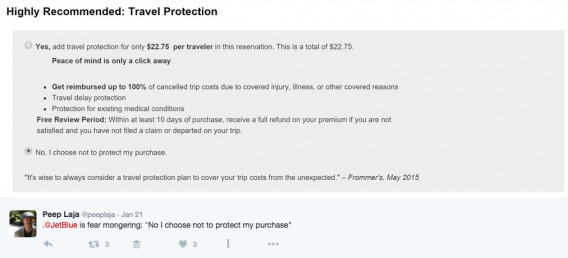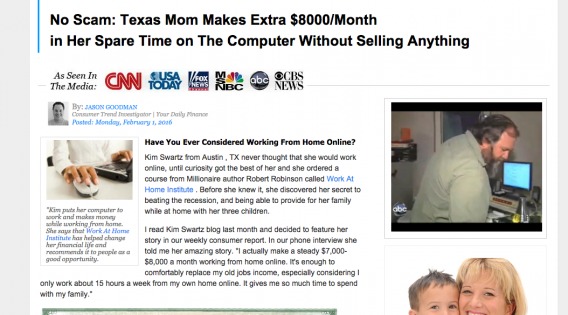And Hope - His Greed - Her Pain
Fear and greed are ii of the three great forces in the earth, co-ordinate to Einstein (the tertiary is stupidity).
They're likewise 2 triggers that straight marketers and copywriters have been well aware of for years. That's because they are powerful emotions that, when used properly, drive people to take activeness.
The purpose of conversion optimization is to drive action—to influence prospects to click "purchase." So how can we employ fear and greed to make more money? Is information technology possible to do and then ethically? Is information technology even effective anymore?
Fear and greed: a history
Financial markets are driven past two powerful emotions—greed and fear.
– onetime Wall Street proverb
Fear and greed are commonly known as the two full general forces that guide financial markets. You lot're definitely enlightened of that Warren Buffett saying (or some variation of information technology), "Be fearful when others are greedy and greedy when others are fearful."
Basically, it's common intuition that in a fearful market, people are looking to irrationally sell stock and in a greedy market people are looking to purchase. The wise ones try to become against the grain and do the reverse, and as the saying goes, "buy low and sell loftier."
Fright and greed have their identify in financial bubbles as well, where, as changingminds.org put it, "prices go upward sharply as people compete to purchase a relatively scarce resource." They give the following explanation:
In a normal purchase situation, if yous purchase something today it is worth about the same tomorrow, yet when prices are rapidly going up, it seems that if yous purchase them now, you are guaranteed a quick render when you sell them in the short to medium term.
Based on the supposition that tomorrow will be much like yesterday, people become greedy every bit they seek the piece of cake win of 'something for nada.'
They besides fear beingness left behind as prices rising beyond their financial reach. Bubbles are also driven by anticipated regret as nosotros feel in the present a sense of the the futurity regret of not ownership now.
Today, you can bank check out whatsoever ane of many fear and greed indexes that purport to assist you make smarter decisions. Here's one by CNN if y'all're curious.
Fear and greed also accept a long history in persuasion. Fear, especially, has been studied every bit a communication device for decades. There'southward empirical support for its effectiveness in driving behavioral and attitudinal modify.
When fear drives conversions
You clearly don't want to inspire fear in your customers well-nigh your product. What works, then, is inspiring fear at the prospect of not having your product.
This is more common than would make you comfortable, but when y'all think about information technology, many industries use this tactic. From home security systems to infant monitors to insurance—peculiarly insurance—marketers have been using fear as a tactic for a long time.
Here's an case Peep shared when shopping for airplane tickets:

Why does fright work?
Fright is a powerful motivator. The last 50 years of empirical research on fearfulness-arousing messaging has shown prove that loftier fear messages are by and large more effective than low fright letters in irresolute people's actions, intentions, and attitudes.
It'southward a deep evolutionary characteristic in humans that triggers us to avert potentially unsafe stimuli. In the modernistic environs, too, a "fearfulness appeal" posits the risks of using and not using a specific product, service, or idea such that if yous don't "buy," some particular dire consequences will occur. Here'southward an example where United Agencies Westward dissever tested email subject lines:
The first field of study line, most $20,000,000 homes burned to the basis, increased leads by 65% for the insurer. That result makes a lot of sense—if one thousand thousand-dollar mansions aren't safe, prospects realized their habitation probably isn't safe either. That'southward a strong motivation to protect themselves from potential damage.
Generally, academic literature isn't entirely conclusive on fear'south effectiveness, but information technology more often than not agrees that more effective fright appeals result from a college fear arousal followed by consequences and recommendations to reduce the negativity. In other words, it needs to be scary enough to the person to result in action, and you demand to guide them to action (with a call to activeness or something they can do to assuage the fear).
Outside of academia, even, doesn't it make intuitive sense? Dating back to Aristotle and continuing today, it has been widely recognized that pain and pleasure are critical motivators.
We're driven towards things that give the states pleasure and avoid that which gives the states pain. Withal, you don't necessarily accept to cause pain to create fright. Here's how changingminds.org put information technology:
The human frontal cortex has a primary role in thinking about the hereafter. We are quite skilled at imagining what might happen and experiencing anticipatory emotions. This has proved helpful in our development, just information technology can likewise cause problems equally predictable fearfulness of things that may not happen cause us stress and allow others to persuade united states.
The almost common use case today for fear appeals seems to be in PSAs that attempt to deter people from engaging in dangerous behaviors. One of the virtually famous examples of all time is the "your brain on drugs" commercial…
How to use fearfulness to convert
Bart Schutz of Online Dialogue listed tips for using fear on his Wheel of Persuasion site:
- Use personally relevant threats (not too small, nor likewise big).
- Brand certain you directly boost your customer's efficacy, by convincingly offer your solution as easy and constructive.
- Provide a clear and stiff call to action directly afterward or side by side to your scaring message.
Don't forget, when your client responds or takes action, to make them feel skillful again past reassuring them they took a step towards a meliorate life.
Personally relevant threats
Of form, fearfulness is contextual. Research supports this—if y'all feel vulnerable to a threat, you're more likely to be nudged toward a desired action. As Natascha de Hoog described nigh the study, "these individuals adjusted their beliefs nigh the effectiveness of the protective action and were trying to persuade themselves that they should engage in the recommendation to eliminate their risk."
Another department in the same paper found similar results:
Vulnerable respondents presented with a bulletin depicting astringent health consequences experienced more negative emotions and perceived the consequences as more than threatening than non-vulnerable respondents. In addition, vulnerable respondents had more positive thoughts about the action recommendation, regardless of argument quality and response costs.
Vulnerability isn't easy to predict, and so personally relevant threats aren't ever every bit like shooting fish in a barrel as knowing your target audience. For example, smokers are enlightened of the dangers of smoking but generally make excuses, because of cerebral dissonance, that lower their own perceived risk.
Nonetheless, honing in on people's vulnerabilities has been a common tactic for years. A classic example…
Promote client'south efficacy
Once you've called a fear appeal that is both loftier-arousal and targeted, you need to convince your customers they tin actually practice something about it. Otherwise, the fear appeal, instead of driving activeness, will bulldoze paralysis.
According to the Wheel of Persuasion, the most of import ingredient in an effective fear entreatment campaign is 'perceived efficacy.' Every bit the commodity says, "perceived efficacy is a combination of both self-efficacy ("can I avert the threat myself?") and response-efficacy ("will the action recommended indeed avert the threat?")."
For example, this fearfulness entreatment calls for the viewers to wearable a helmet—something hands implementable:
If your message is sufficiently scary and seems like shooting fish in a barrel enough to avoid, then y'all but demand to requite your viewers a call to action, or a way to assuage the fear (usually with your product or solution)…
Provide a call to activity (assuage the fear)
The less friction users have on the path to assuaging their fears, the more than likely they are to commit the desired action. And so make it clear and easy to take action. Here's how BetterChange put it:
Brand information technology easy for people to follow up on your recommendation. Put your call-to-action right adjacent to the fright entreatment, so that when yous scare them, they immediately striking the "I want to insure" push. As well, be sure to tell them how effective your solution is when they hit the button! "Our insurance covers all you demand as a car owner so you don't have to worry nigh it anymore!"
In practice, this doesn't always expect as dramatic as scary anti-smoking ads. Information technology could simply be making visitors aware of the negative consequences of missing out (scarcity) and providing a way for them to avert those consequences (purchase now, or ship before Christmas):

Frequently, you don't need to (and maybe shouldn't) manufacture whatever fearful elements. Simply sympathize that your client has their own internal fears when they state on your page, and if you lot can pattern elements to assuage that fear, you're more likely to catechumen them.
At the other side of fear, traditionally is greed (or some would call it promise)…
Greed is proficient?
Greed is the 2nd emotion included in former Wall Street quotes and advice. Possibly it is fifty-fifty more famous, mainly considering of the iconic Gordon Gekko speech communication..
Greed likewise has its history in financial market psychology. Wikipedia gives the bear on on financial bubbles equally an example:
The Dot-com bubble, also knowns as Cyberspace bubble, referenced the speculative investment chimera that was created around new internet startup companies between the years 1995-2000. In that time, exorbitant prices of new Internet companies motivated investors to invest into companies whose concern plans included a "dot com" domain. Investors becomes greedy, creating further greed, resulting in securities being heavily overpriced, which eventually created a bubble.
Something for nothing: the power of free
Much of the emotional power of greed comes from a form of hope, where the expected reward far exceeds the expected time and cost to exist invested. In the real world, this manifests itself in many ways, such equally gambling, go-rich-quick schemes, and other forms of selling.
In conversion optimization, this frequently takes the form of offering things for "gratis." Now, gratis is by no ways a silverish bullet (we wrote a whole commodity on that), but there are some times when it is effective. Here's the executive summary on using 'free' to catechumen:
- Sometimes it works, sometimes it doesn't. There are instance studies that support both sides.
- Free trials and freemium products have proven to be effective acquisition tactics.
- "Free" tends to concenter tire kickers and oft converts in the short term (without strong lifetime value).
- There is certainly academic back up to the irrational sway that gratis things accept on people's decision making. The key is to figure out when and how to execute.
Get-rich-quick and the darker side of greed selling
Here's how changingminds.org explained greed:
It typically involves making the other person believe that they are getting an incredible bargain (ofttimes without your apparent knowledge). Of form, they don't get what they had hoped for, but they will do a peachy bargain for you if they think yous can requite them something for virtually nothing.
So you lot can see the potential for darker utilise cases, right? The most common manifestation of ethically challenged use cases for greed is, at least in pop civilisation, the conviction trick ("con").
Confidence men make use of both fear and greed. They normally start with greed by tempting people with what seems like a certain disproportionate gain (they gain more they invest in time or money). They'll usually let you gain small amounts to prove the system works.
Then they'll lay hints that the organization isn't strictly 'legal' but in that location'due south no chance of getting defenseless—this leaves you, subsequently you find out you've been duped, unable to become to the police.
Pyramid schemes work on a like model, where the money from new investors is used to pay off existing investors, thus sustaining the illusion of a working system.
Finally, y'all'll meet this blazon of a fear/greed appeal in scammy sales letter commonly selling go rich products. Here'due south an example I found from a Google search:

Note that I'chiliad from Austin, Texas, so I should be suckered in right away knowing that a Texas mom is making $8k extra a calendar month in her spare time. This is probably to get my greed/hope triggered. If she can do it, I tin can besides, correct? (Besides, I dear the "no scam" in the headline. Nice touch.)
Of grade the re-create is filled with greed appeals. Merely they make sure to sprinkle in some fear appeals, mainly through scarcity measures:

Is this a brusk term strategy?
And then sure, some scammy companies use these tactics to brand some sales. Simply equally nosotros've seen there is also some empirical research supporting the effectiveness of fear and greed. Nevertheless, not everyone agrees this is a sustainable strategy for virtually companies. Famous copywriter Mark Ford (pen name: Michael Masterson) has this to say:

Mark Ford:
"Well-nigh 6 months agone, I had a chat with a copywriter who'd had astonishing success with several fear-and-greed promotions. In fact, his commissions on all the sales from those campaigns should have come up to more than a million dollars. I say "should take," because his clients discovered that many of the buyers brought in by his fear-and-greed promotions asked for refunds. And those that stayed were not expert buyers of their other products…
…Sure, using fright sometimes seemed necessary—to keep the kids from riding their bikes in the nighttime without headlights, for example. But mostly information technology paralyzed the person I wanted to motivate. I found information technology to be both heavy-handed and impuissant. There were many other emotions and desires I could stimulate that would get the task done.
And greed? I grew upwards in a household where greed was considered a deadly sin—"the devil's instrument." I had no want to use information technology equally my own.
I wanted to build my career by working with, and selling to, people who, like me, were subject to greed and fear but wanted to rise above those base impulses."
From what I've noticed, the best fright campaigns are aimed at avoiding dangerous behaviors, like smoking. Otherwise, a subtle use of fright (otherwise known every bit scarcity, which I honestly don't think is really fright inducing), has clearly shown to be effective in many cases.
Blatant, impuissant attempts at triggering fear and greed seem to piece of work only on unsophisticated buyers or those that are looking for deals, short term proceeds, or something that doesn't exist (easy riches or happiness).
Determination
While fearfulness and greed take a romantic connotation that conjures images of Wall Street wisdom, Gordon Gekko, and classic ads, in that location is a wide earth of emotion outside of these broad categories that you can employ to persuade buyers.
Information technology certainly helps to know the power of fear and greed, especially on an academic level, to pepper them into appropriate campaigns. Especially if you're in an manufacture where there is a level of natural internal fear in your customers (security systems), learning how to evoke that in a respectful way on your site tin can help propel conversions.
However, there are many, many employ cases that aren't so benevolent. In fact, because fright and greed are traditionally irrational emotions that override rational determination making, they're often used in confidence scams or get rich schemes. Still then, it'southward important to know their power, if only to avoid those attempts yourself.
Feature prototype source
Source: https://cxl.com/blog/fear-and-greed/
Enregistrer un commentaire for "And Hope - His Greed - Her Pain"